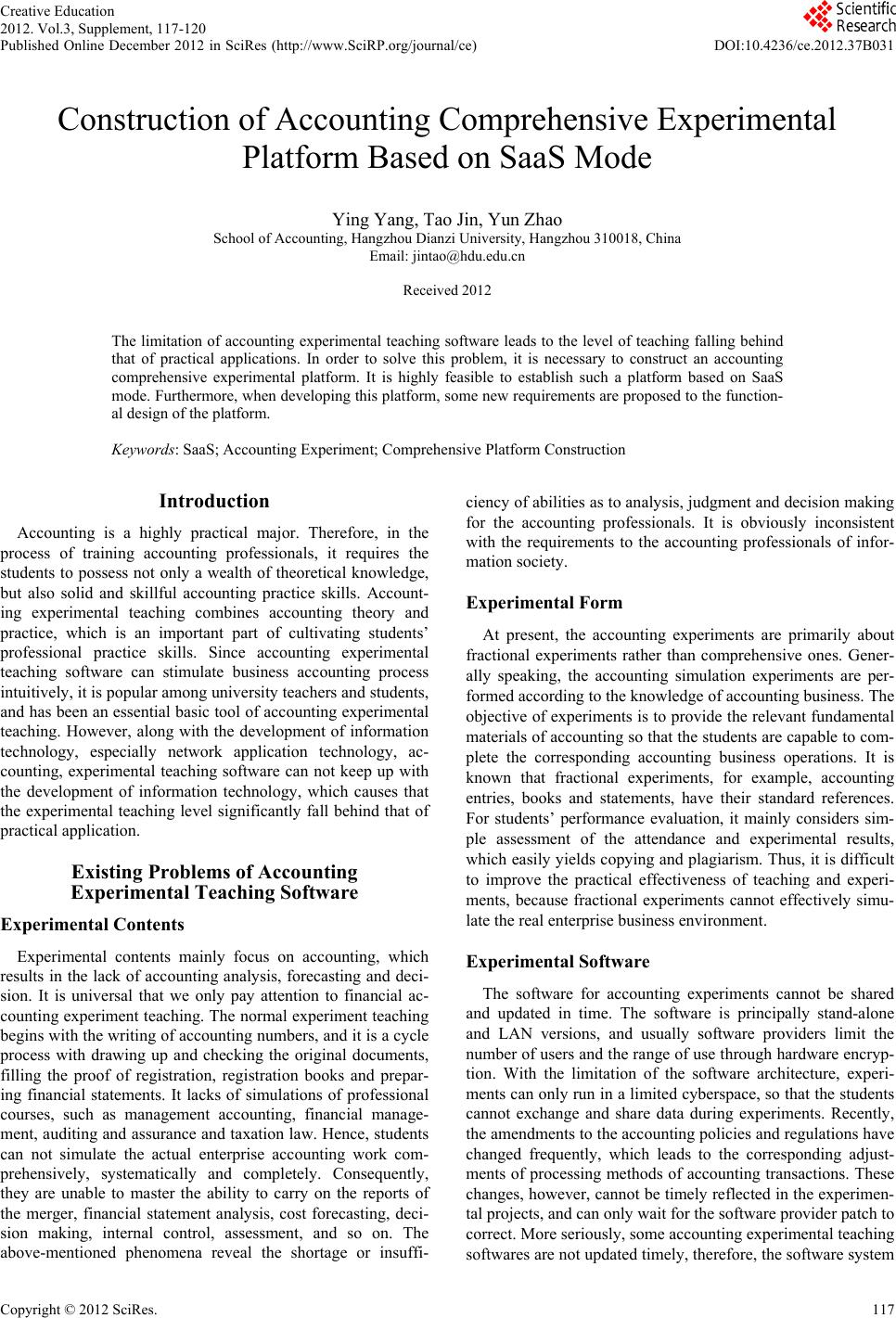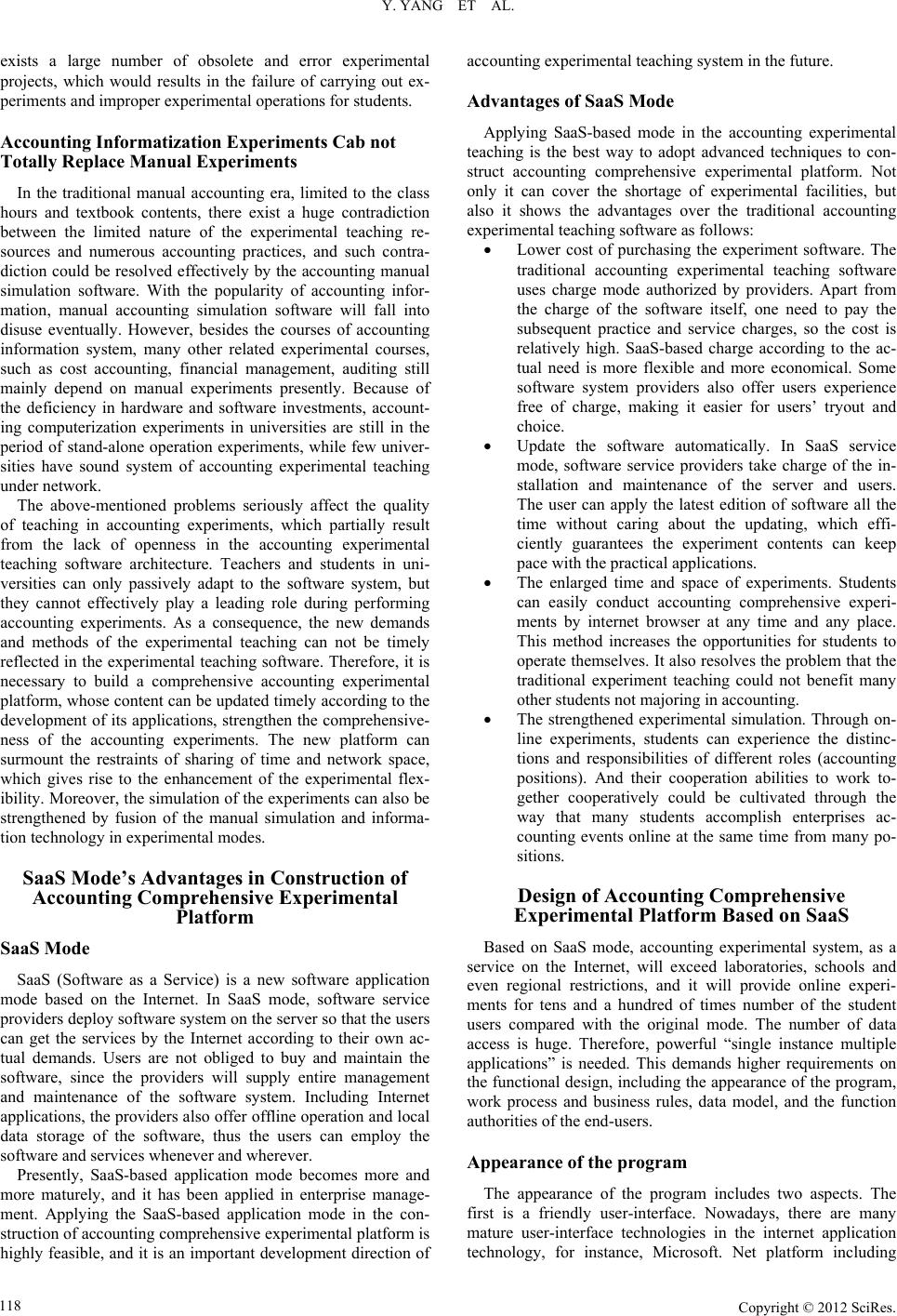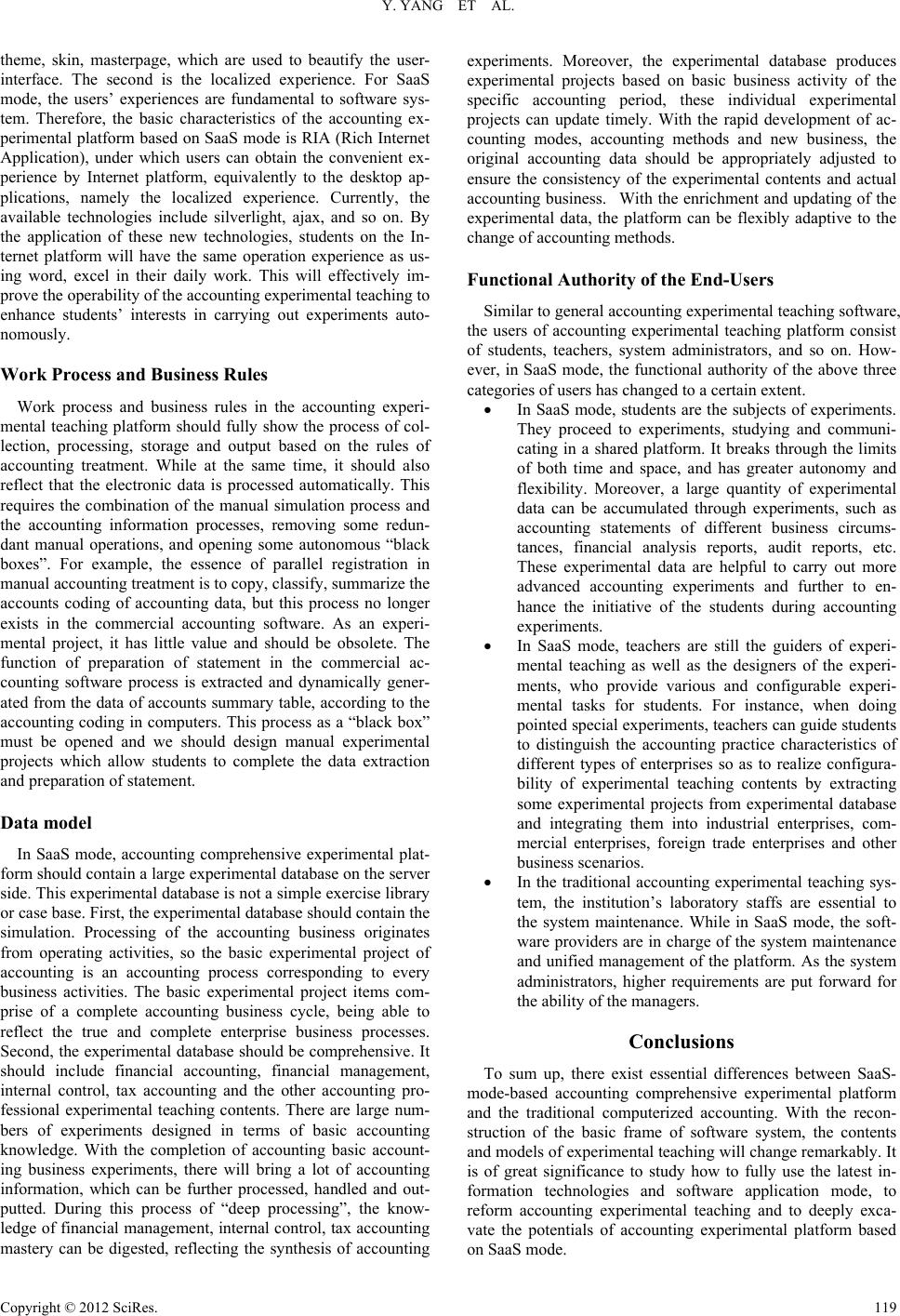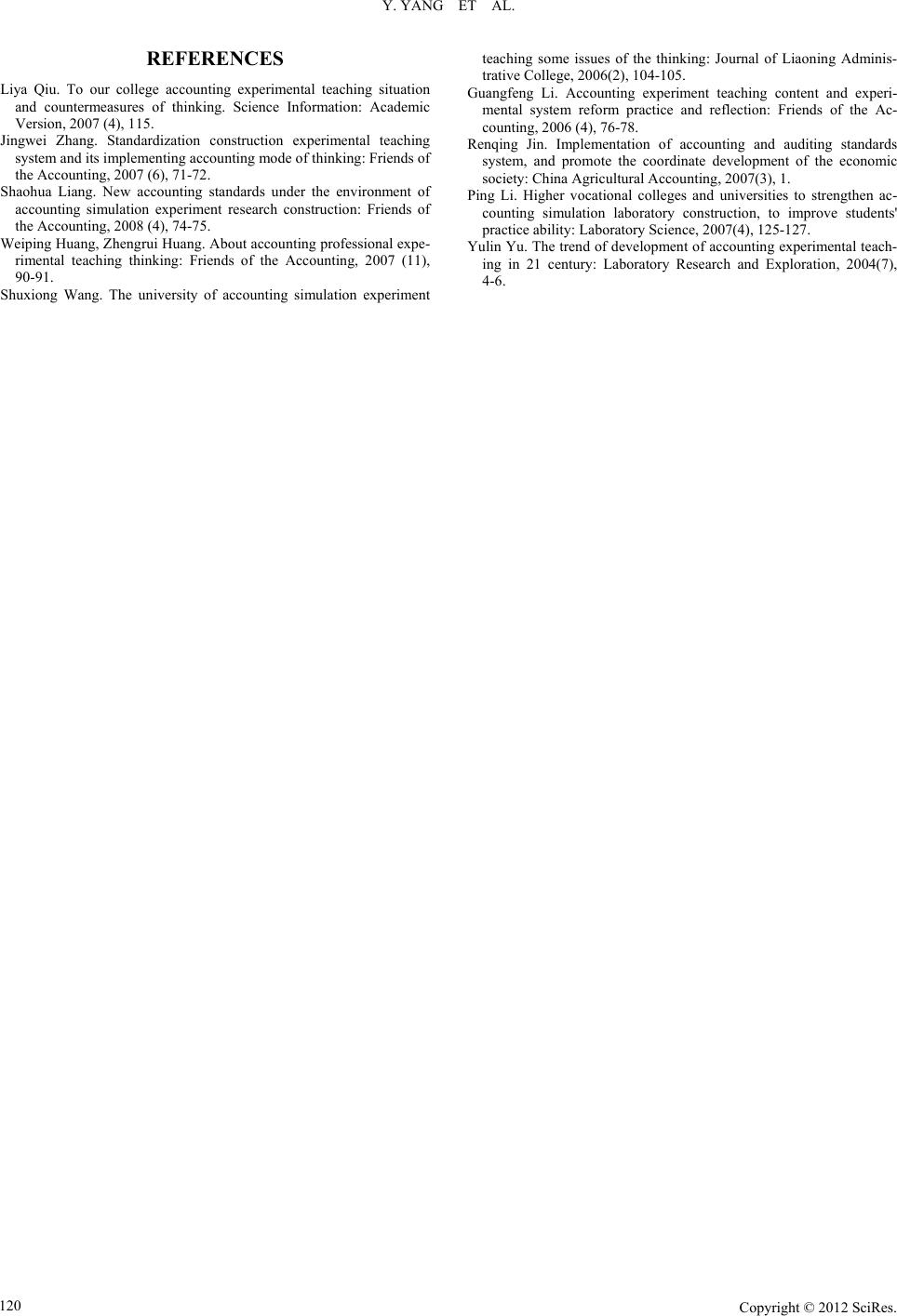Paper Menu >>
Journal Menu >>
 Creative Education 2012. Vol.3, Supplement, 117-120 Published Online December 2012 in SciRes (http://www.SciRP.org/journal/ce) DOI:10.4236/ce.2012.37B031 Copyright © 2012 SciRes. 117 Construction of Accounting Comprehensive Experimental Platform Based on SaaS Mode Ying Yang, Tao Jin, Yun Zhao School of Accounting, Hangzhou Dianzi University, Hangzhou 310 018, China Email: jintao@hdu.edu.cn Received 2012 The limitation of accounting experimental teaching software leads to the level of teaching falling behind that of practical applications. In order to solve this problem, it is necessary to construct an accounting comprehensive experimental platform. It is highly feasible to establish such a platform based on SaaS mode. Furthermore, when developing this platform, some new requirements are proposed to the function- al design of the platform. Keywords: SaaS; Accounting Experiment; Comprehensive Platform Construction Introduction Accounting is a highly practical major. Therefore, in the process of training accounting professionals, it requires the students to possess not only a wealth of theoretical knowledge, but also solid and skillful accounting practice skills. Account- ing experimental teaching combines accounting theory and practice, which is an important part of cultivating students’ professional practice skills. Since accounting experimental teaching software can stimulate business accounting process intuitively, it is popular among university teachers and students, and has been an essential basic tool of accounting experimental teaching. However, along with the development of information technology, especially network application technology, ac- counting, experimental teaching software can not keep up with the development of information technology, which causes that the experimental teaching level significantly fall behind that of practical application. Existing Problems of Accounting Experimental Teaching Software Experimental Contents Experimental contents mainly focus on accounting, which results in the lack of accounting analysis, forecasting and deci- sion. It is universal that we only pay attention to financial ac- counting experiment teaching. The normal e xperiment teaching begins with the writing of accounting numbers, and it is a cycle process with drawing up and checking the original documents, filling the proof of registration, registration books and prepar- ing financial statements. It lacks of simulations of professional courses, such as management accounting, financial manage- ment, auditing and assurance and taxation law. Hence, students can not simulate the actual enterprise accounting work com- prehensively, systematically and completely. Consequently, they are unable to master the ability to carry on the reports of the merger, financial statement analysis, cost forecasting, deci- sion making, internal control, assessment, and so on. The above-mentioned phenomena reveal the shortage or insuffi- ciency of abilities as to analysis, judgment and decision making for the accounting professionals. It is obviously inconsistent with the requirements to the accounting professionals of infor- mation s ociety. Experimental Form At present, the accounting experiments are primarily about fractional experiments rather than comprehensive ones. Gener- ally speaking, the accounting simulation experiments are per- formed according to the knowledge of accounting business. The objective of experiments is to provide the relevant fundamental materials of accounting so that the students are capable to com- plete the corresponding accounting business operations. It is known that fractional experiments, for example, accounting entries, books and statements, have their standard references. For students’ performance evaluation, it mainly considers sim- ple assessment of the attendance and experimental results, which easily yields copying and plagiarism. Thus, it is difficult to improve the practical effectiveness of teaching and experi- ments, because fractional experiments cannot effectively simu- late the real enterprise business environment. Experimental Softwa re The software for accounting experiments cannot be shared and updated in time. The software is principally stand-alone and LAN versions, and usually software providers limit the number of users and the range of use through hardware encryp- tion. With the limitation of the software architecture, experi- ments can only run in a limited cyberspace, so that the students cannot exchange and share data during experiments. Recently, the amendments to the accounting policies and regulations have changed frequently, which leads to the corresponding adjust- ments of processing methods of accounting transactions. These changes, however, cannot be timely reflected in the experimen- tal projects, and can only wait for the software provider patch to correct. More seriously, some accounting experimental teaching softwares are not updated timely, therefore, the software system  Y. YANG ET AL. Copyright © 2012 SciRes. 118 exists a large number of obsolete and error experimental projects, which would results in the failure of carrying out ex- periments and improper experimental operations for students. Accounting Informatization Experiments Cab not Totally Replace Manual Experiments In the traditional manual accounting era, limited to the class hours and textbook contents, there exist a huge contradiction between the limited nature of the experimental teaching re- sources and numerous accounting practices, and such contra- diction could be resolved effectively by the accounting manual simulation software. With the popularity of accounting infor- mation, manual accounting simulation software will fall into disuse eventually. However, besides the courses of accounting information system, many other related experimental courses, such as cost accounting, financial management, auditing still mainly depend on manual experiments presently. Because of the deficiency in hardware and software investments, account- ing computerization experiments in universities are still in the period of stand-alone operation experiments, while few univer- sities have sound system of accounting experimental teaching under network. The above-mentioned problems seriously affect the quality of teaching in accounting experiments, which partially result from the lack of openness in the accounting experimental teaching software architecture. Teachers and students in uni- versities can only passively adapt to the software system, but they cannot effectively play a leading role during performing accounting experiments. As a consequence, the new demands and methods of the experimental teaching can not be timely reflected in the experimental teaching software. Therefore, it is necessary to build a comprehensive accounting experimental platform, whose content can be updated timely according to the development of its applications, strengthen the comprehensive- ness of the accounting experiments. The new platform can surmount the restraints of sharing of time and network space, which gives rise to the enhancement of the experimental flex- ibility. Moreover, the simulation of the experiments can also be strengthened by fusion of the manual simulation and informa- tion technology in experimental modes. SaaS Mode’s Advantages in Construction of Accounting Comprehensive Experimental Platform SaaS Mode SaaS (Software as a Service) is a new software application mode based on the Internet. In SaaS mode, software service providers deploy software system on the server so that the users can get the services by the Internet according to their own ac- tual demands. Users are not obliged to buy and maintain the software, since the providers will supply entire management and maintenance of the software system. Including Internet applications, the providers also offer offline operation and local data storage of the software, thus the users can employ the software and services whenever and wherever. Presently, SaaS-based application mode becomes more and more maturely, and it has been applied in enterprise manage- ment. Applying the SaaS-based application mode in the con- struction of accounting comprehensive experimental platform is highly feasible, and it is an important development direction of accounting experimental teaching system in the future. Advantages of SaaS Mode Applying SaaS-based mode in the accounting experimental teaching is the best way to adopt advanced techniques to con- struct accounting comprehensive experimental platform. Not only it can cover the shortage of experimental facilities, but also it shows the advantages over the traditional accounting experimental teaching software as follows: • Lower cost of purchasing the experiment software. The traditional accounting experimental teaching software uses charge mode authorized by providers. Apart from the charge of the software itself, one need to pay the subsequent practice and service charges, so the cost is relatively high. SaaS-based charge according to the ac- tual need is more flexible and more economical. Some software system providers also offer users experience free of charge, making it easier for users’ tryout and choice. • Update the software automatically. In SaaS service mode, software service providers take charge of the in- stallation and maintenance of the server and users. The user can apply the latest edition of software all the time without caring about the updating, which effi- ciently guarantees the experiment contents can keep pace with the practical applications. • The enlarged time and space of experiments. Students can easily conduct accounting comprehensive experi- ments by internet browser at any time and any place. This method increases the opportunities for students to operate themselves. It also resolves the problem that the traditional experiment teaching could not benefit many other students not majoring in accounting. • The strengthened experimental simulation. Through on- line experiments, students can experience the distinc- tions and responsibilities of different roles (accounting positions). And their cooperation abilities to work to- gether cooperatively could be cultivated through the way that many students accomplish enterprises ac- counting events online at the same time from many po- sitions. Design of Accounting Comprehensi ve Experimental Platform Based on SaaS Based on SaaS mode, accounting experimental system, as a service on the Internet, will exceed laboratories, schools and even regional restrictions, and it will provide online experi- ments for tens and a hundred of times number of the student users compared with the original mode. The number of data access is huge. Therefore, powerful “single instance multiple applications” is needed. This demands higher requirements on the functional design, including the appearance of the program, work process and business rules, data model, and the function authorities of the end-users. Appearance of the program The appearance of the program includes two aspects. The first is a friendly user-interface. Nowadays, there are many mature user-interface technologies in the internet application technology, for instance, Microsoft. Net platform including  Y. YANG ET AL. Copyright © 2012 SciRes. 119 theme, skin, masterpage, which are used to beautify the user- interface. The second is the localized experience. For SaaS mode, the users’ experiences are fundamental to software sys- tem. Therefore, the basic characteristics of the accounting ex- perimental platform based on SaaS mode is RIA (Rich Internet Application), under which users can obtain the convenient ex- perience by Internet platform, equivalently to the desktop ap- plications, namely the localized experience. Currently, the available technologies include silverlight, ajax, and so on. By the application of these new technologies, students on the In- ternet platform will have the same operation experience as us- ing word, excel in their daily work. This will effectively im- prove the operability of the accounting experimental teaching to enhance students’ interests in carrying out experiments auto- nomously. Work Process and Business Rules Work process and business rules in the accounting experi- mental teaching platform should fully show the process of col- lection, processing, storage and output based on the rules of accounting treatment. While at the same time, it should also reflect that the electronic data is processed automatically. This requires the combination of the manual simulation process and the accounting information processes, removing some redun- dant manual operations, and opening some autonomous “black boxes”. For example, the essence of parallel registration in manual accounting treatment is to copy, classify, summarize the accounts coding of accounting data, but this process no longer exists in the commercial accounting software. As an experi- mental project, it has little value and should be obsolete. The function of preparation of statement in the commercial ac- counting software process is extracted and dynamically gener- ated from the data of accounts summary table, according to the accounting c oding in computers. This process as a “black box” must be opened and we should design manual experimental projects which allow students to complete the data extraction and preparation of statement. Data model In SaaS mode, accounting comprehensive experimental plat- form should contain a large experimental database on the server side. This experimental database is not a simple exercise library or case ba se. Fi rst, the experiment al da ta bas e should contain the simulation. Processing of the accounting business originates from operating activities, so the basic experimental project of accounting is an accounting process corresponding to every business activities. The basic experimental project items com- prise of a complete accounting business cycle, being able to reflect the true and complete enterprise business processes. Second, the experimental database should be comprehensive. It should include financial accounting, financial management, internal control, tax accounting and the other accounting pro- fessional experimental teaching contents. There are large num- bers of experiments designed in terms of basic accounting knowledge. With the completion of accounting basic account- ing business experiments, there will bring a lot of accounting information, which can be further processed, handled and out- putted. During this process of “deep processing”, the know- ledge of financial management, internal control, tax accounting mastery can be digested, reflecting the synthesis of accounting experiments. Moreover, the experimental database produces experimental projects based on basic business activity of the specific accounting period, these individual experimental projects can update timely. With the rapid development of ac- counting modes, accounting methods and new business, the original accounting data should be appropriately adjusted to ensure the consistency of the experimental contents and actual accounting business. With the enrichment and updating of the experimental data, the platform can be flexibly adaptive to the change of accounting methods. Functional Autho ri ty of the E nd-Users Similar to general accounting experimental teaching software, the users of accounting experimental teaching platform consist of students, teachers, system administrators, and so on. How- ever, in SaaS mode, the functional authority of the above three categories of users has changed to a certain extent. • In SaaS mode, students are the subjects of experiments. They proceed to experiments, studying and communi- cating in a shared platform. It breaks through the limits of both time and space, and has greater autonomy and flexibility. Moreover, a large quantity of experimental data can be accumulated through experiments, such as accounting statements of different business circums- tances, financial analysis reports, audit reports, etc. These experimental data are helpful to carry out more advanced accounting experiments and further to en- hance the initiative of the students during accounting experiments. • In SaaS mode, teachers are still the guiders of experi- mental teaching as well as the designers of the experi- ments, who provide various and configurable experi- mental tasks for students. For instance, when doing pointe d special expe rime nts, teach ers can guide students to distinguish the accounting practice characteristics of different types of enterprises so as to realize configura- bility of experimental teaching contents by extracting some experimental projects from experimental database and integrating them into industrial enterprises, com- mercial enterprises, foreign trade enterprises and other business scenarios. • In the traditional accounting experimental teaching sys- tem, the institution’s laboratory staffs are essential to the system maintenance. While in SaaS mode, the soft- ware providers are in charge of the system maintenance and unified management of the platform. As the system administrators, higher requirements are put forward for the ability of the managers. Conclusions To sum up, there exist essential differences between SaaS- mode-based accounting comprehensive experimental platform and the traditional computerized accounting. With the recon- struction of the basic frame of software system, the contents and models of experimental teaching will c ha nge r emarkably. It is of great significance to study how to fully use the latest in- formation technologies and software application mode, to reform accounting experimental teaching and to deeply exca- vate the potentials of accounting experimental platform based on SaaS mode.  Y. YANG ET AL. Copyright © 2012 SciRes. 120 REFERENCES Liya Qiu. To our college accounting experimental teaching situation and countermeasures of thinking. Science Information: Academic Version, 2007 ( 4), 115. Jingwei Zhang. Standardization construction experimental teaching system and its implementing accounting mode of thinking: Friends of the Accounting, 2007 (6), 71-72. Shaohua Liang. New accounting standards under the environment of accounting simulation experiment research construction: Friends of the Accounting, 2008 (4), 74-75. Weiping Huang, Zhengrui Huang. About accounting professional expe- rimental teaching thinking: Friends of the Accounting, 2007 (11), 90-91. Shuxiong Wang. The university of accounting simulation experiment teaching some issues of the thinking: Journal of Liaoning Adminis- trative College, 2006(2), 104-105. Guangfeng Li. Accounting experiment teaching content and experi- mental system reform practice and reflection: Friends of the Ac- counting, 2006 ( 4), 76-78. Renqing Jin. Implementation of accounting and auditing standards system, and promote the coordinate development of the economic society: China Agricultural Accounting, 2007(3), 1. Ping Li. Higher vocational colleges and universities to strengthen ac- counting simulation laboratory construction, to improve students' practice ability: Laboratory Science, 2007(4), 125-127. Yulin Yu. The trend of dev elopment of accounting experimental teach- ing in 21 century: Laboratory Research and Exploration, 2004(7), 4-6. |

